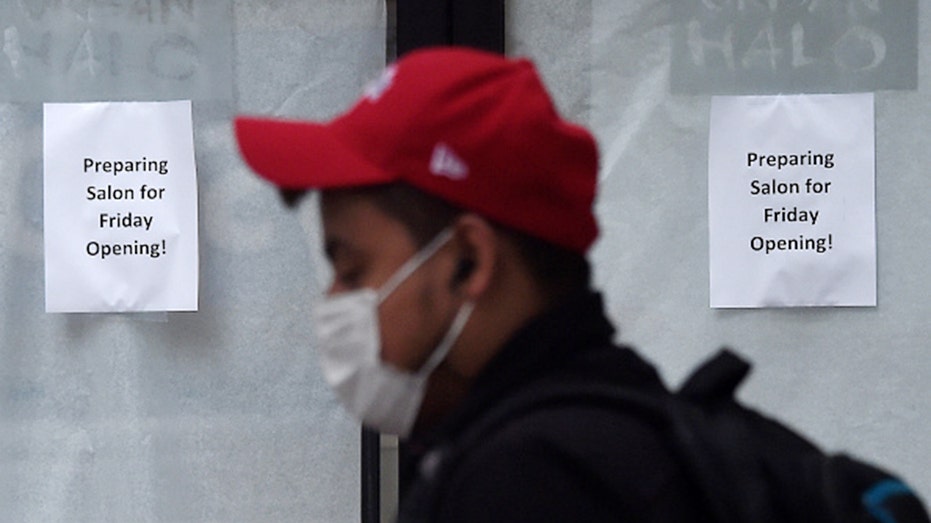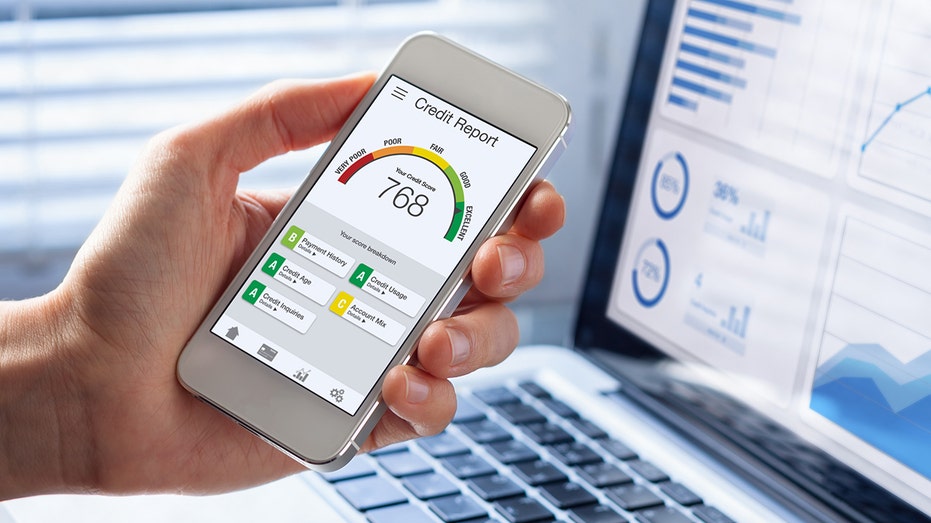With payments on pause, watch your credit score
The degree to which the law protects credit varies by loan type
The federal government has directed lenders to give consumers a break on some of their monthly bills amid the coronavirus crisis -- without reporting them as delinquent or past due. However, individuals should be more vigilant than usual about monitoring their credit reports and scores.
The intent of the measure, included in the stimulus bill passed in late March, is to let people skip payments without damaging their credit scores, three-digit numbers lenders rely on to make decisions about whom to extend loans to, and how much to charge in interest.
The aim is to preserve consumers' "ability to recover when this crisis is over," said Chi Chi Wu, a staff attorney at the nonprofit National Consumer Law Center.
HOW TO GET RID OF $5,000 OF CREDIT CARD DEBT
Still, the degree to which the law protects credit varies by loan type. And with millions of people putting various types of loan payments on pause, lenders may make errors when reporting a loan's status to the companies that compile credit-related information, Ms. Wu said.

A man, wearing a face mask, walks past a hair salon ready to reopen in Arlington, Virginia, on May 28, 2020. (Photo by OLIVIER DOULIERY/AFP via Getty Images)
Here's what you need to know.
What is a credit score?
Each month, your lenders report whether you paid your loans on time to the three credit-reporting companies, Experian PLC, Equifax Inc. and TransUnion. These companies publish credit reports, a record of how much you have borrowed and your repayment history.
They feed that information to other companies that use proprietary formulas to compile credit scores that give lenders a quick way to assess the risk of lending you money. Fair Isaac Corp.'s standard FICO scores range from 300 to 850.
Borrowers who miss even one payment can see their scores fall by as much as 100 points, Ms. Wu, said. (The scores also consider factors including the number of loans and credit cards you have and your balances as a fraction of your approved borrowing limits, also known as credit utilization.)
PROTECT YOUR CREDIT SCORE DURING CORONAVIRUS CRISIS — 5 THINGS YOU SHOULD DO RIGHT NOW
Damaging information can stay on credit reports for up to seven years, or longer for bankruptcies. Borrowers with lower credit scores pay higher interest rates on loans. On a $200,000 mortgage, someone with a credit score of 800 would pay 2.93%, which translates into $100,805 in interest over 30 years. A borrower with a score of 670 would pay 3.54%, or $125,503 in total interest.
Are all borrowers eligible for credit protection under the new law?
No. The credit-related provisions of the law apply to borrowers who receive "accommodations" from their lenders, such as a temporary suspension of monthly payments or a reduction in the amount due.
Most federally backed student loans and mortgages are eligible for the payment relief that triggers credit protection.

In this Wednesday, May 13, 2020, photo, Amy Witt, owner of the Velvet Window, wipes a credit card reader after completing a sale with a customer at her store, in Dallas. (AP Photo/LM Otero)
For example, the law requires student-loan servicers to automatically suspend payments and freeze interest accruals from March 13 to Sept. 30 on federal student loans owned by the U.S. Department of Education. The law also requires student-loan servicers to report these borrowers as current on their payments, said Mark Kantrowitz, vice president of research at Savingforcollege.com.
With federally backed mortgages, the rules are different.
Borrowers who want payment relief of up to 12 months must request it. Lenders are required to grant relief, at least for a few months at a time, and maintain the loan's status for credit-reporting purposes.
That means that if you were current on your mortgage when you received payment relief, your lender must continue to report you as current, said John Ulzheimer, a credit specialist and former executive at Equifax.
SHOULD YOU GET A PERSONAL LOAN TO PAY OFF CREDIT CARD DEBT?
If you were 30 days late, the mortgage lender is allowed to continue to report you as 30 days late during your relief period.
What if I have other types of loans?
The law's credit protections also apply to borrowers who receive accommodations on other types of loans, including credit cards, auto loans and private student loans, said Michael Ziegler, a bankruptcy attorney in Clearwater, Fla.
The key difference is that the law doesn't require these lenders to give borrowers payment accommodations, although many are doing so, Mr. Ulzheimer said.

Credit Report with Score rating app on smartphone screen showing creditworthiness / iStock
When it comes to credit reporting, the requirements if the accommodations are granted are the same as with federally backed mortgages. If the borrower was current before receiving payment relief, the lender must generally continue to report the loan as current. If the borrower was behind, the lender is allowed to continue to report the loan as delinquent until the borrower brings the account back to good standing.
Have any borrowers with suspended payments seen their credit scores decline?
Mr. Ziegler said that despite the law's goal of shielding credit reports, "any time there is anything other than consistent pay-in-full, that can adversely affect credit scoring" and a lender's willingness to extend a consumer credit at the lowest rates.
A lawsuit filed on May 20 in the U.S. District Court for the Northern District of California alleges that Great Lakes Educational Loan Services Inc., a student-loan servicer, reported borrowers with suspended payments as in "deferment" rather than as though the payment had been made, as the law instructs.
The suit alleges that the reporting error affected 4.8 million borrowers, causing many to see declines in credit scores published by VantageScore Solutions LLC, a FICO competitor. Some borrowers saw reductions of up to 100 points, said Moira Vahey, spokeswoman for the nonprofit Student Borrower Protection Center, which is supporting the lawsuit, filed on behalf of affected borrowers.
EVERYTHING YOU NEED TO KNOW ABOUT PERSONAL LOANS
VantageScore declined to comment on the lawsuit. In an online post, it acknowledged that some consumers have seen their "scores change as a result of the unprecedented widespread use of forbearance and deferment codes for consumers loans that have received payment relief." The company said it adjusted the algorithms it uses to calculate credit scores "to minimize the potential of any negative impact associated" with some of the ways lenders are reporting payment suspensions to the credit reporting companies.
Great Lakes said it had used the incorrect credit-reporting code but said it has fixed the error and doesn't believe consumers' credit scores were affected.
Joanne Gaskin, vice president at FICO, which isn't named in the suit, said there was no negative impact on FICO credit scores.

Credit Score rating based on debt reports showing creditworthiness or risk of individuals for student loan, mortgage and payment cards / iStock
She cautioned that borrowers whose payments are suspended could see their credit scores decline if interest continues to accrue on these loans during the suspension period. The reason: With interest occurring, the balance rises, a negative for credit scores.
GET FOX BUSINESS ON THE GO BY CLICKING HERE
Any reduction in a borrower's credit score "shouldn't be substantial," Ms. Gaskin said, and may be offset by other factors that positively affect credit scores, such as a longer credit history.
What steps should I take to protect my credit?
In response to the virus, each of the three credit-reporting companies is providing one free weekly credit report until April 2021, versus one per year ordinarily at AnnualCreditReport.com.
You can get a free monthly FICO score from more than 200 lenders, including American Express Co., Wells Fargo & Co., and Discover Financial Services, said Ms. Gaskin. Credit Karma Inc. provides free VantageScores.
How can I contest errors?
It's important to follow the procedure under the Fair Credit Reporting Act to preserve your right to sue, said Ms. Wu. Send a written dispute to each credit-reporting company publishing incorrect information and the lender involved. File it on company websites or send the dispute by certified mail. The Consumer Financial Protection Bureau publishes a sample letter.
The credit-reporting companies must normally respond within 30 days, but the CFPB has said it won't penalize them for taking longer during the crisis.
CLICK HERE TO READ MORE ON FOX BUSINESS




















